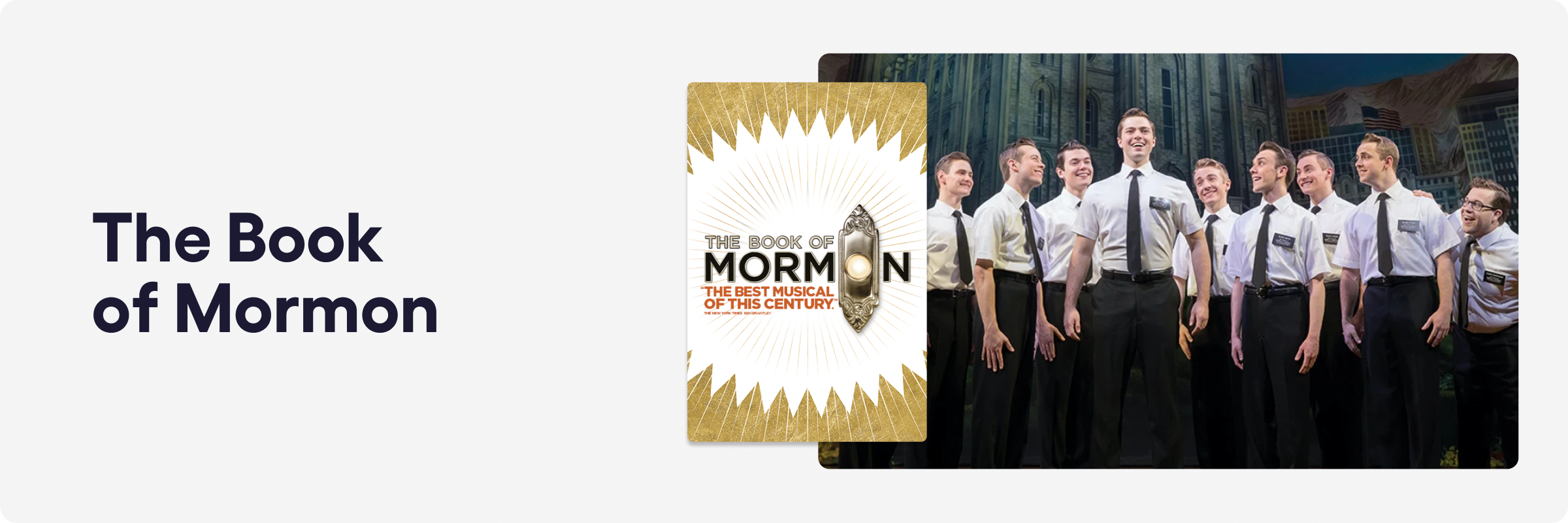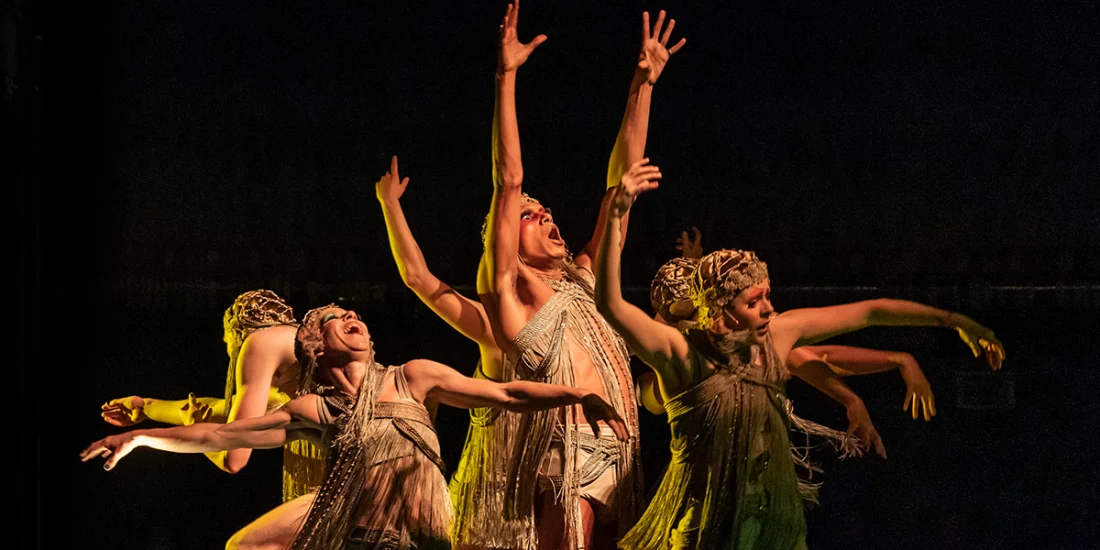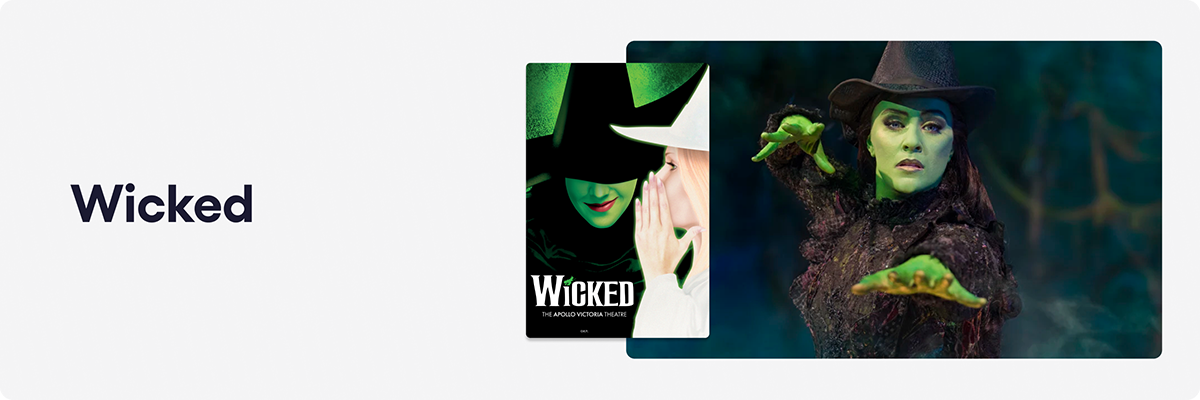A complete guide to all the songs in ‘Cabaret’
Discover all the songs in the Cabaret musical and get tickets now.
John Kander and Fred Ebb's timeless Cabaret score is filled with musical theatre gems: "Maybe This Time," "Money," and "Mein Herr" all feature in the interwar musical.
Set in early 1930s Berlin, Cabaret charts the rise of Nazi Germany through those who interact with the Kit Kat Club. Throughout the musical, audiences meet English cabaret performer Sally Bowles, American writer Cliff Bradshaw, the elusive Emcee, as well as boarding house owner Fräulein Schneider and Jewish fruit seller Herr Schultz.
According to London Theatre, Cabaret is "the ultimate escape. After a difficult or even ordinary day, the fanfare, glitz, and glamour feel like a portal to another time."
The Cabaret 2021 revival cast recording was released on 20 Jan. 2023. The recording features Eddie Redmayne as the Emcee, Jessie Buckley as Sally Bowles, Liza Sadovy as Fraulein Schneider, and Elliot Levey as Herr Schultz. Listen to the 2021 Cabaret cast recording.
Find out more about the Cabaret music and plan a visit to the Kit Kat Club in the West End.
Cabaret is at the Kit Kat Club.
Book Cabaret tickets on London Theatre.
“Willkommen”
Welcome to the Kit Kat Club. It’s a place where anything goes. During the opening number, the Emcee invites audiences to the club, greeting audiences with a multilingual hello; “Willkommen, Bienvenue, Welcome.” When Kander and Ebb created the music, the opening song’s vamp was one of the first musical phrases set in stone. Speaking to The Independent, the pair said: “When you find something you like, it tells you about the direction you want to go in. I don't mean you go through the process in a doped-up haze, but you have to trust your unconscious.”
“So What?”
It’s not all sparkles and glitz in Cabaret. Interwar Berlin is a dangerous place to be, and it’s hard to survive. When Fräulein Schneider offers American writer Cliff Bradshaw a room for 100 reichsmarks (around £45 a month), she eventually has to settle for Cliff’s 50 marks. In this song, Schneider reflects that you have to take what life offers — so what if it’s not what you expect.
"Don't Tell Mama"
“Don’t Tell Mama” is the first chance audiences have to see Sally Bowles in Cabaret. Before the song, the Emcee introduces her as the "Toast of Mayfair”. You’ll want to raise a glass to the brazen English singer as she performs a flirty number about her past debauchery.
"Mein Herr"
Sally Bowles isn’t a one-trick pony. She’s got a variety of musical numbers up her sleeve. In "Mein Herr", the females play backup to Sally as she leads the brassy song about an overbearing man who tries to tame his woman. Nobody will rain on Sally's parade.
“Perfectly Marvellous”
Cliff doesn’t just write for a living, he teaches English to his German friends and their fellow acquaintances. His life takes another unexpected turn when he decides to live with Sally Bowles — Sally's former flame Max kicked her out. At first, Cliff doesn’t want to live with Sally, but who can resist Sally's charm?
"Two Ladies”
Bee-dle-dee bee-dle-dee dee, two ladies! This uptempo ditty sees the Emcee and two female singers perform a musical number that reflects Cliff and Sally’s new roommate situation.
"It Couldn't Please Me More (A Pineapple)"
Fraulein Schneider’s boarder, Herr Schultz, offers Schneider a pineapple as a romantic gesture. The Jewish fruit seller doesn’t have much, but in giving her the citrus fruit, it shows he wears his heart on his sleeve. Who knew a pineapple could represent so much?
“Tomorrow Belongs to Me”
As Cabaret progresses, discussions about Nazi Germany rise to the surface too. In “Tomorrow Belongs to Me,” the congregation sing in unison about the Fatherland. The Nazi-inspired marching song was originally created to warn people about the rise of the political movement; it’s now an alt-right political anthem.
"Maybe This Time"
When Sally learns she’s pregnant, she’s unsure of who the father is. To save further anguish, she decides to abort the baby. Cliff tries to convince her to have the baby, but Sally reflects on her life so far. “Maybe This Time” is a haunting ballad that focuses on a woman on the edge of despair.
"Money"
For the Emcee, “Money” makes the world go round. It’s possible this is also the case for Cliff. When Ernst Ludwig offers Cliff the chance to earn easy money, Cliff weighs up the options. Should he pick up a suitcase in Paris and deliver it to his client? Or should he say no and stay in Berlin?
"Married"
Herr Schultz proposes to Fräulein Schneider, but it’s not all romantic. Prior to asking her hand in marriage, Schneider’s boarder, Fräulein Kost, reveals that she's seen the pair together. To save their reputation, Schultz mentions they’re getting married. But Schultz was serious. The pair are soon to be wed!
"Tomorrow Belongs to Me" (Reprise)
The political undertones kick up a notch at the end of Act One. Kost tells Ernst Ludwig that Schultz is a Jew, leaving Kost with no choice but to warn Schneider of her future nuptial plans. By the end of the reprise, it’s clear that nobody is safe in Berlin. Who does tomorrow belong to?
“Kickline”
The Act 2 opener blurs the lines between politics and the Kit Kat Club. At the start of this dance routine, the cabaret girls and the Emcee perform a kickline. Then, it quickly transpires into the goose-step; the military march lines up as precise choreography.
"If You Could See Her (The Gorilla Song)"
Don’t be too alarmed when a gorilla suit-clad performer walks onto stage after the glass shatters. In this song, the Emcee encourages audiences to see beyond their first impressions. But, the gorilla acts as a symbol of what Nazis viewed as the master race — the gorilla is viewed as a Jew.
"What Would You Do?"
Fräulein Schneider is caught between a rock and a hard place. She returns Schultz's engagement present and calls the wedding off, fearing for her future. Cliff reasons with Schneider to stay strong, but in a testing political climate, what would you, or indeed anyone do?
"I Don't Care Much"
Cliff wants to leave Berlin with Sally Bowles in tow. Cliff pleads for the pair to live in America, but Sally still believes in Berlin’s beauty. For her, life is beautiful. In this song, Sally declares that politics has nothing to do with them and defiantly returns to the Kit Kat Club.
"Cabaret"
What good is sitting alone in your room? Come hear the music play! Well for Sally Bowles, there's little point dwelling on what could happen. In this song, Sally cements her decision to live in ignorance; not knowing is better than fearing. Life is a cabaret, after all.
“Willkommen" (Reprise)
In the final number, Cliff recalls his time in Berlin: there was a cabaret, a master of ceremonies, and a woman. At the same time, the Emcee repeats the opening lyrics at the start of "Willkommen", inviting people into their way of life. Unlike the beginning, “Willkommen” now carries a darker tone. By the end of the musical number, all the Cabaret characters silently walk onto stage and stand in single file.
See more shows in the West End
Book Mamma Mia! tickets on London Theatre.

Originally published on



